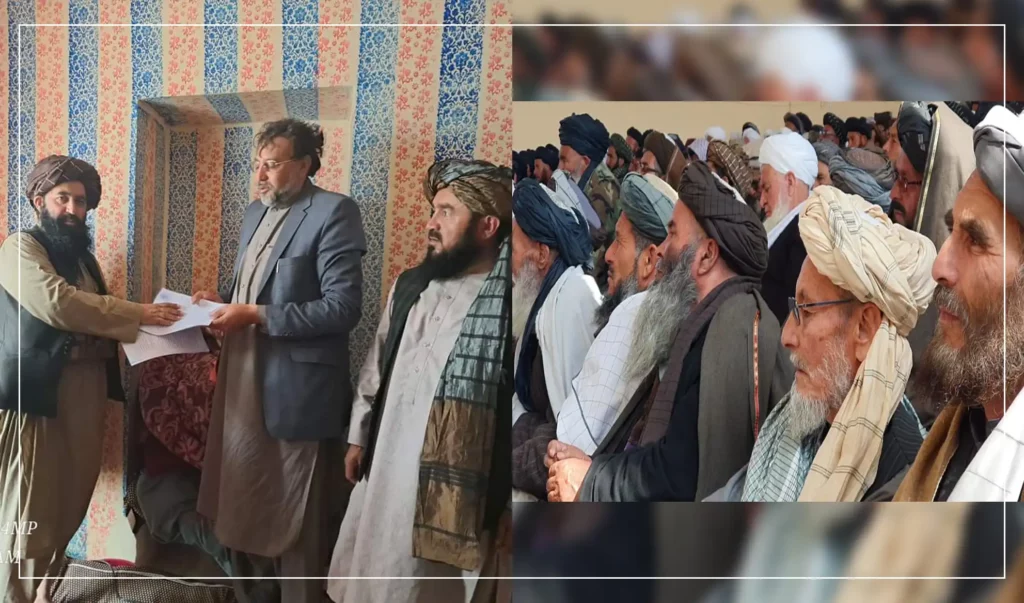FEROZKOH (Pajhwok): Government officials and jirgas mediated and resolved 26 enmities among tribes and families during the past one and a half years in western Ghor province.
Ghor Vice and Virtue department head Maulvi Ghulam Farooq told Pajhwok Afghan News: “Earlier, there were many differences among the people in districts and villages of the province”.
These differences had resulted in violence and killing and injuring of many people and plundering of people’s properties. “Alhamdulillah, after the return of the Islamic Emirate government, these problems and disputes have been resolved.”
He said over the past one and a half years, 26 blood feuds among different ethnic groups and families in Ghor province had been resolved with the mediation of government officials, religious scholars and jirgas.
Referring to the recently resolved enmity between Pahlawan and Bayeen tribes in Taiwara district, he said their enmity caused more than 300 people to be killed and injured on both sides and hundreds of others were displaced.
He added similar enmities were resolved in other districts and regions.
Enmities cause insecurity, prevent society from development
Abdul Karim Rahimi, a civil society activist in Ghor, told Pajhwok that enmities not only resulted in causalities and financial losses to the people, but also prevented the society from development and caused illiteracy and migrations.
He said: “Unfortunately, such enmities last for many years, badly affecting the families involved as they suffer causalities, financial losses, migration from their homes and their children are deprived of education and face a miserable life.”
He believed differences among ethnic groups and families were the main factor behind the backwardness of the society.
Pointing to the role of jirgas in resolving enmities in Ghor and other provinces of the country, he said: “Thankfully, in the last two years in Ghor and other provinces, many enmities were resolved.”
Rahimi said the reconciliation program should be expanded to the entire country and should continue until there were no differences in the society.
Tribal Affairs director Maulvi Mohammad Hussain Forqani considered it necessary to end differences and enmities among tribe and families.
He said ending disputes and enmities would please Allah (swt) and establish order and peace in society.
He added: “We want the people to embrace each other under the same flag as brothers and accept each other and live in peace.”
At the same time, Rahima Amir, one of the civil society activists, said peace among ethnic groups would ensure better security and peace in the country.
He added: “Differences and grudges between ethnic groups last long and everyone young people, children and the elderly become their victim and many become homeless. Since the regime change, many such feuds have been resolved. It’s good that different tribes live together in peace and everyone goes anywhere without any problems.”
Amir called on all conflicting groups to stop divisiveness and violence and work together brotherly for sustainable peace and development of the country.
He added that the continuation of differences led to social problems and backwardness of the society and brought about only destruction.
Sayed Ali Agha Mushfeq, an influential figure in Lal wa Sarjangal district, said he had witnessed many years of enmities between different tribes and families in the district.
He told Pajhwok the enmities caused life, financial losses and also caused mental and emotional problems.
He added that the root cause of these hostilities among ethnic groups in the last one decade had been political. The enmities resulted in many killings and peoples’ migrations.
As a result of the hostilities, more than 300 people were killed and injured in the district and hundreds of others were forced to migrate, Mushfeq said.
Viewing the change of the country’s political system in the interest of the public, he added: “The people themselves saw and concluded that ethnic animosities were created by the war and its related propaganda for shedding the blood of the youth, for the loss of property and capital and for backwardness in economic progress. The enmities only resulted in migrations and destruction. But through mediation of tribal jirgas and efforts of the current government, people are now living a normal life together.”
People who ended hostilities are happy
Hussain Ali, a 41-year-old resident of Lal wa Sarjangal district, who suffered as a result of political and ethnic differences, said that he lost his young son in this way and spent more than five years in migration in Iran.
Ali, who has not forgotten the loss of his son, was optimistic about the resolution of such differences in society and said: “We are happy that the differences of the Hazara people have been resolved as a result of efforts of the current system and the decision-making of the people themselves, and we are now living in an atmosphere of unity and mutual acceptance. We forgave what happened between people in the past and what we witnessed and we will live peacefully.”
He added: “A life in peace is a blessing, we ask the people and ethnic groups to put aside their differences and make peace with each other.”
He and his family members were forced to leave their region due to enmity and currently they were happy to have returned to their area and country after five years. “Now we live in a normal and peaceful environment”.
Abdul Qadir, a resident of Ferozkoh city, said: “In the past, enmities made it impossible for people to go from one village to another, no one felt safe, now the hostilities have ended and everyone can go wherever they want.”
Maulvi Abdul Hai Zaim, Ghor information and culture director, also asked people to take inspiration from the Islamic Emirate and pardon each other.
He said: “We are optimistic about the role of jirgas and efforts made by various departments and the local administration. This is a good move because several cases of ethnic disputes have been resolved.”
sa/ma







GET IN TOUCH
NEWSLETTER
SUGGEST A STORY
PAJHWOK MOBILE APP